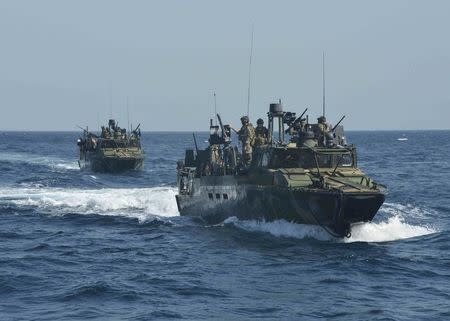Iran's Guards say U.S. sailors will probably be freed

By Bozorgmehr Sharafedin and Sam Wilkin DUBAI (Reuters) - Ten U.S. sailors detained by Iran's Islamic Revolutionary Guards Corps (IRGC) appeared to have entered Iranian waters by mistake and will probably be released, the IRGC's top naval commander said on Wednesday. Iran detained the sailors aboard two U.S. Navy patrol boats in the Gulf on Tuesday in an incident that rattled nerves days ahead of the expected implementation of a landmark nuclear accord between Tehran and world powers. "Our investigations show the two U.S. Navy boats entered Iranian territorial waters due to a broken navigation system," IRGC Rear Admiral Ali Fadavi was quoted as saying by the Tasnim news agency, which is close to the Guards. "The final order will be issued soon and they will probably be released," he added. The incident could exacerbate tensions between Iran and the United States. Some conservatives in both countries have criticised the nuclear deal, under which Iran will curb its nuclear activities in exchange for lifting of sanctions. The deal is due to be implemented in the coming days. Iran's armed forces chief, Major General Hassan Firouzabadi, said the incident should demonstrate Iranian strength to "troublemakers" in the U.S. Congress, which has sought to put pressure on Iran after the nuclear deal. And at a presidential campaign rally in the United States, Republican frontrunner Donald Trump, who accuses President Barack Obama of being weak on foreign policy, described the incident as "an indication of where the hell we're going". DE-ESCALATION Attributing the boats' incursion into Iranian waters to a navigation error marked a de-escalation in rhetoric. Earlier, the Guards had said the boats were "snooping" in Iranian territory and said Foreign Minister Mohammad Javad Zarif had demanded an apology from Washington. Before Fadavi's comments, a spokesman for the IRGC dismissed comments by U.S. officials that the sailors would be promptly released, and said they were being interrogated on Farsi Island, close to where they were seized. "What others say about the sailors' prompt release is their speculation, and I don't confirm or deny it," IRGC spokesman Ramazan Sharif told Tasnim. "If, during the interrogation, we find out that they were on an intelligence gathering mission, we will treat them differently," he said. The IRGC, the Islamic Republic's praetorian guard, is highly suspicious of U.S. military activity near Iran's borders and many senior officers suspect Washington of pursuing regime change in Tehran. The IRGC operates land and naval units separate to the regular armed forces and stages frequent wargames in the Gulf, which separates Iran from its regional rival Saudi Arabia and a U.S. naval base in Bahrain. Last month, the U.S. Navy said an IRGC vessel fired unguided rockets near the aircraft carrier USS Harry S. Truman in the Strait of Hormuz, a critical shipping route for crude oil that connects the Gulf to the Indian Ocean. Iran denied the vessel had done so. In April 2015, the Guards seized a container ship belonging to Maersk, one of the world's major shipping lines, in the Gulf because of a legal dispute between the company and Iran. The ship and its 24 crew members were released after 10 days. The Guards have also seized British servicemen on two occasions, in 2004 and 2007, and a civilian British yacht crew in 2009. On each occasion the sailors were released unharmed after several days. (Reporting by Bozorgmehr Sharafedin; Writing by Sam Wilkin; Editing by Sami Aboudi and Peter Graff)

